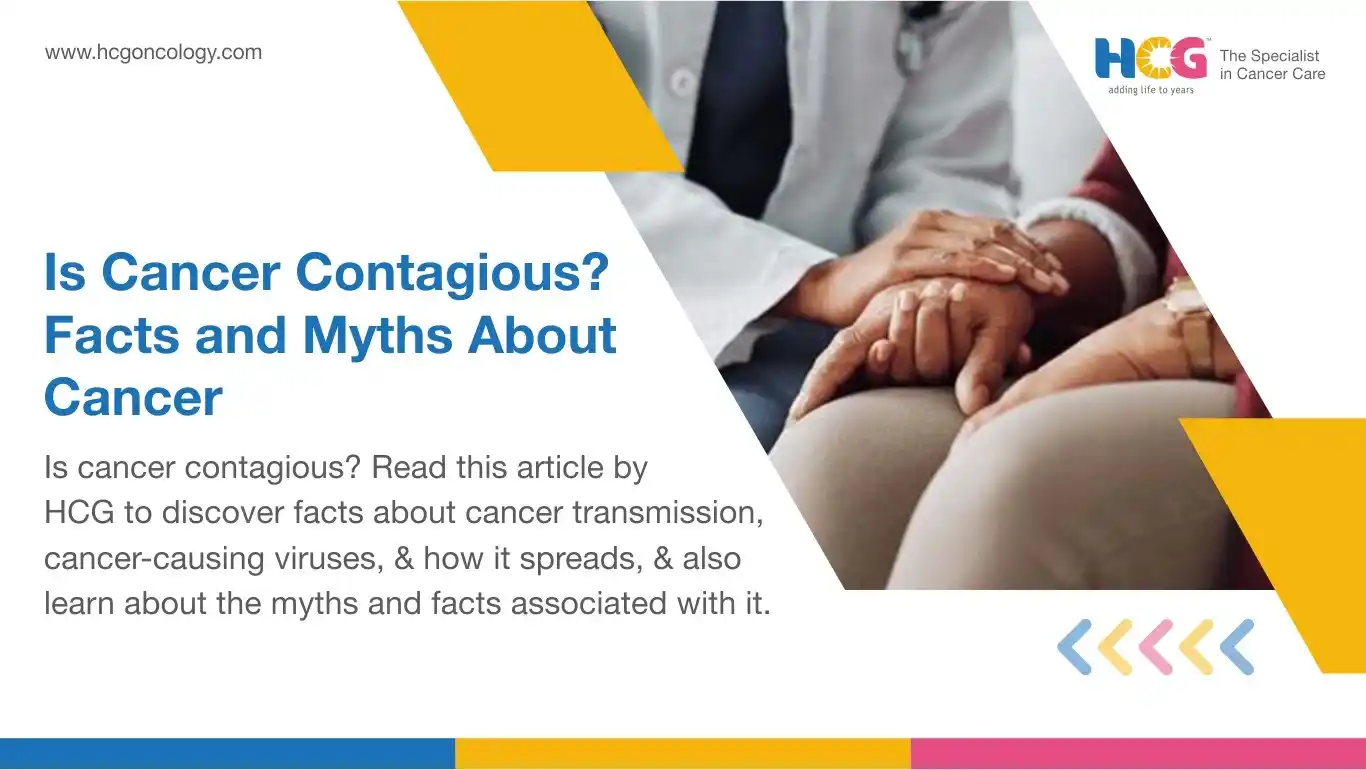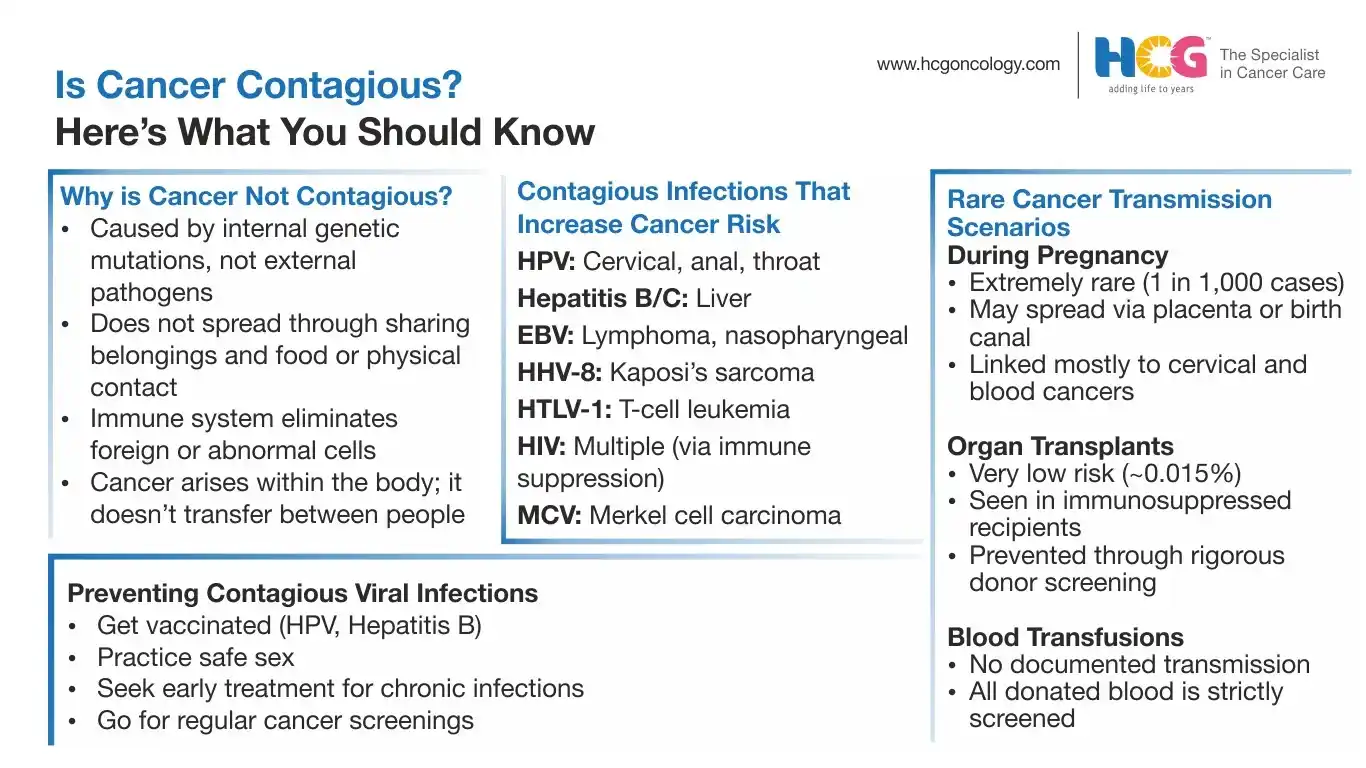
07 Nov, 2025
Feel free to reach out to us.

07 Nov, 2025

This article is medically reviewed by Dr. Sangram Keshari Panda, Consultant- Surgical Oncology, HCG Panda Cancer Hospital, Cuttack.
Is cancer contagious? Let’s clear the confusion.
No, cancer is not contagious.
But there's more to consider. When we say cancer is not contagious, questions like “Can cancer spread from mother to child during pregnancy?” and “Can cancer be transmitted through blood transfusion?” come up, and these are important questions.
So, here is a dedicated article by HCG, wherein we answer the question, “Is cancer contagious?” in detail and touch upon other aspects like the risk of cancer being passed on during pregnancy, blood transfusion, or organ transplant; contagious viral infections that can increase one’s risk; and myths and facts around this topic.

Generally speaking, cancer is not contagious, i.e., it does not spread from one individual to another. Cancer occurs when there is a mutation, an undesirable change in the DNA structure in one of the cells, causing the growth and multiplication of abnormal cells.
Cancer is not contagious for the following reasons:
1. Cancer is Caused by Genetic Mutations: Mutations or changes in the structure of specific genes in the cells can transform into cancer cells and lead to abnormal cell division. This happens within the body and has nothing to do with coming in contact with those diagnosed with cancer.
2. Cancer is Not Caused by Pathogens: Cancer is not caused by exposure to viruses, bacteria, or other pathogens, for it to be contagious.
However, exposure to chronic infections caused by certain viruses and bacteria may increase the risk of the development of certain cancers.
3. Defense Mechanism of Our Immune System: Harmful viruses and bacteria are identified and destroyed by the body’s defense system.
Additionally, our immune system is programmed to identify and kill any foreign particles that enter our body from outside.
4. No Evidence of Cancer Spreading from Physical Contact: Years of studies have proven that cancer cannot be transmitted through touch or sharing meals. It arises from mutations that occur within the body.
Cancer cannot be transmitted through blood transfusions or organ transplants in healthy individuals.
Blood and organ donors are thoroughly screened at the blood bank and transplant centers in order to prevent any risk.
However, in very rare cases, it is possible for cancer to be transmitted through organ transplants, usually when the recipient is immunosuppressed so that their body doesn’t reject the organ with its natural defense mechanism. Reports suggest that this risk is as low as 0.015%.
“Is cancer contagious to babies, and can it be transferred during pregnancy?” It is one of the most commonly asked questions.
In general, the transmission of cancer from the host to the recipient is not possible, as there is no viable transmission route, and there is the presence of immune recognition in recipients.
However, cancer can be transmitted from a mother to her child during pregnancy. That said, it is of a very rare occurrence. It may occur once every 1000 pregnancies annually, as per study reports. It accounts for 0.07 - 0.1% of all malignant tumors. The most common ways for cancer to spread to the child are through the placenta (during pregnancy) and the vagina (during delivery).
The most common types of cancer found during pregnancy are, understandably, similar to the most common cancers in younger women. They include breast, cervical, thyroid, colon, and ovarian cancers, as well as melanoma, lymphoma, and leukemia.
It is usually not possible to know exactly why one person develops cancer and another doesn’t.
But research has shown that certain risk factors may increase a person’s chances of developing cancer. Certain factors are associated with a lower risk of cancer. These are sometimes called protective risk factors or just protective factors.
Here are some factors that influence cancer risk:
Additional Reading: Top 10 Causes of Cancer | HCG
According to the National Cancer Institute, there are more than 200 types of HPV. Of them, about 12 types are categorized as “high-risk” types and are found to cause different types of anogenital cancers, along with oropharyngeal cancers.
Many types of HPV are spread through skin-to-skin contact during vaginal, anal, or oral sex. Because the virus can spread through skin contact, condom and dental dam use can lower, but not completely prevent, the chances of transmission.
In most cases, HPV infections clear off by themselves. However, on rare occasions, these infections become persistent and lead to the development of cancer.
Additional Reading: HPV Vaccine Reduces Cervical Cancer Risk | HCG Oncology
Epstein-Barr virus (EBV) is a type of herpes virus. EBV is most often spread through saliva. It can be contracted through coughing, sneezing, and close contact, such as kissing or sharing personal items.
The virus can transmit through blood and semen. This means you can encounter it through sexual contact, blood transfusions, or organ transplants.
Most EBV infections occur during childhood, although not everyone who contracts the virus has symptoms. Once you’ve contracted it, it remains in your body for the rest of your life in a dormant stage.
HHV-8 is reported to cause Kaposi’s sarcoma, a type of cancer that causes reddish-purple, pink, or brown lesions in patients with a compromised immune system, especially those diagnosed with HIV. This virus is also referred to as Kaposi’s sarcoma-associated herpesvirus (KSHV).
Lesions caused by HHV-8 are often visible on the skin.
This virus can be transmitted through saliva, sexual contact, blood transfusion, mother-to-child transmission, and organ transplantation.
This virus is reported to cause adult T-cell leukemia (ATL leukemia), lymphoma, and a specific type of skin cancer.
It is found to spread through sexual contact, breastfeeding, blood transfusion, and sharing needles.
Not all patients infected with HTLV-1 develop cancer; only 2-5% of infected individuals are reported to develop cancer.
Hepatitis is the medical term for inflammation (swelling) in your liver. Hepatitis B is liver inflammation caused by infection with the hepatitis B virus (HBV). Inflammation can damage your liver. HBV can spread through contact with blood, open sores, or body fluids of a person who is infected.
Hepatitis C is liver inflammation and damage caused by infection with the hepatitis C virus. Hep C can cause a mild illness that lasts a short time (acute) or a serious illness that can last the rest of your life (chronic).
You generally get infected with the hepatitis C virus when you come into contact with the blood, even a tiny amount, from a person who is infected.
The infection caused by this virus lives inside the body without any symptoms throughout one’s life. This virus is commonly found on the skin and other tissues.
In rare cases, MCV causes Merkel cell carcinoma, an aggressive type of skin cancer.
MCV commonly spreads through saliva, skin-to-skin contact, and environmental exposure.
HIV is a retrovirus that can lead to the development of AIDS. HIV infects and destroys cells in the immune system called helper T-cells. As the numbers of these cells decline, the immune system has a harder time fighting infections.
HIV spreads through bodily fluids, including blood, semen, and vaginal fluids.
It’s important to note that HIV doesn’t cause cancer by itself, but it contributes to the formation of cancer by weakening the immune system.
Here are some popular myths about cancer and its contagiousness.
Fact: No, cancer is not contagious, and it cannot spread through physical contact.
Fact: Cancer occurs through genetic mutations in your cells; therefore, you can still develop cancer even if no one in your family has it.
Fact: Having a family history of cancer increases your cancer risk slightly; however, it does not guarantee a cancer diagnosis for you.
Fact: Donors are screened rigorously before blood transfusions and organ transplants, and therefore, it is very rare for recipients to get cancer from these procedures.
Fact: Certain contagious infections like HPV, HBV, EBV, etc., can increase the risk of cancer; however, they do not guarantee a cancer diagnosis.
Fact: In exceedingly rare cases, cancers can spread from the mother to the fetus during pregnancy. However, it is so rare that it almost never occurs.
Additional Reading: 7 Myths about Cancer That Everyone Believes | HCG Oncology
The purpose of this article was to answer some burning questions, like “Is cancer contagious or not?”, “Is any cancer contagious?”, and “Is any type of cancer contagious?”
Cancer is not contagious itself and cannot spread from person to person through blood, sexual contact, or casual contact like kissing. However, some viruses linked to cancer, such as HPV, Epstein-Barr virus, Hepatitis B and C, and HIV, can be transmitted between people and increase the risk of developing cancer.
In very rare cases, cancer cells may be passed via organ transplants or from mother to baby during pregnancy.
Knowing these facts helps clear up myths and encourages compassionate care for cancer patients.

Dr. Sangram Keshari Panda
Consultant - Surgical Oncology
MBBS, MS (Surgery), DrNB (Surg Oncology), FMAS, MNAMS, FIAGES, FALS (Oncology)
Dr. Sangram Keshari Panda is a surgical oncology consultant with 8 years. He is available for consultations at HCG Panda Cancer Hospital, a leading cancer hospital in Cuttack. He specializes in the surgical management of all major cancers. He believes in personalizing cancer, based on the individual health needs of each patient.
Appointment Link: Book an Appointment with Dr. Sangram Keshari Panda